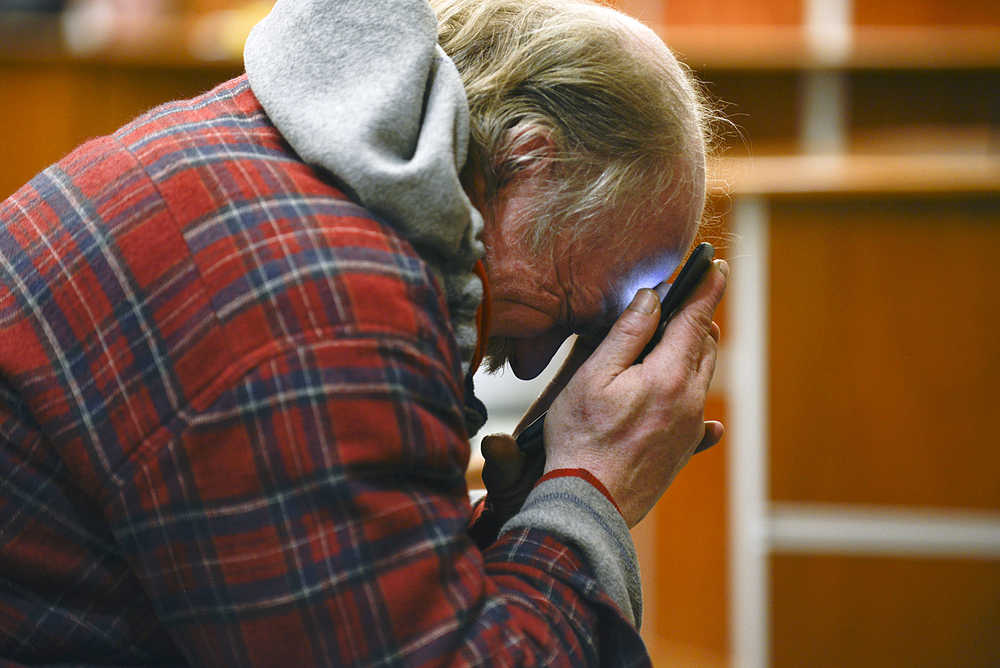Barring relief on appeal or any unforeseen circumstances for at least four of the next seven years, Boxes for Heroes founder Frank Roach will be behind bars.
Kenai Superior Court Judge Carl Bauman combined the nine counts of scheming to defraud and theft that Roach was convicted of in April and sentenced him to seven years of prison time on Friday, with the possibility of parole in 48 months.
The charges stem from Roach’s time with Boxes for Heroes, which he founded in 2010. The organization collected donations under the premise that it would send care packages to troops overseas.
An investigation led by Kenai Police Department Investigator Jeff Whannell revealed the charity had raised more than $140,000 in donations from April 2010 to October 2011. Roach used used that money as his sole source of income.
During the trial, Roach’s bank statements revealed he had spent about $5,000 on synthetic marijuana, or Spice. He spent and about $800 on postage for boxes during the same time period.
Both Bauman and Roach’s voices broke as they spoke during the sentencing hearing. Roach teared up several times while making a statement about his intentions
when he founded Alaska Veteran’s Outreach Boxes for Heroes, while Bauman got emotional as he described the impact Roach’s theft had on the people in the community who thought their donations would be given to members of the military.
“The victims expected their donations to benefit the morale of the troops,” Bauman said before his voice broke. He paused for a few seconds before finishing, “And in that sense, that expectation cannot be restored.”
The sentence is more than the five years Roach’s attorney Andrew Miller asked for and less than the 10 years prosecuting attorney Charles Agerter requested.
Miller, as he did in the trial, sought to frame Roach as incompetent but not malicious.
“From the get-go, the organization was overly focused on what Mr. Roach knew how to do: solicit donations, often through aggressive telemarketing,” Miller wrote in his sentencing memorandum. “Meanwhile there was little to no accounting or management structure to ensure the organizational goal of sending boxes to troops was legitimately achieved.”
During the hearing, Miller said Roach had acted recklessly, but evidence pointed toward his good intentions.
“He, from the very start, was making critical errors that were not stopped. But, it wasn’t a (situation of) trying to take someone’s money and specifically put it into his pocket,” Miller said. “There were substantial steps taken towards getting packages assembled, getting packages to the troops.”
Agerter said he saw the situation differently.
“The defendant went on probation for check fraud and then immediately started engaging in worse behavior. His criminal conduct got much worse,” Agerter said during the hearing.
Agerter said Roach’s reputation is in tatters on the Kenai Peninsula and in parts of Alaska, but that he had the potential to solicit donations in other states — from people who are not aware of Roach’s convictions.
“He’s much more skilled at solicitation than what was presented by the defense in the trial,” Agerter said. “The type of business he was running wasn’t overly complicated. It’s a matter of taking the boxes and dropping them off at the National Guard. Frequently when he would drive to the Wildwood storage facility, he would drive actually by the armory. So it shouldn’t have been that difficult for him to bring these items over to them.”
In his sentencing memorandum, Agerter wrote that Roach had used the military’s image to compound his crime.
“This was not a situation where the defendant was solely motivated by money,” Agerter wrote in his sentencing memorandum. “He soaked up media appearances. He was quoted in newspaper articles. He lied about his military career. Most of all, he focused attention on himself instead of the military men and women serving their country. In essence, the defendant vicariously stole and used the military men and women’s vested public image. He used the military’s vested integrity to steal money.”
The jury that convicted Roach also found that Roach’s crime was compounded by aggravating factors, including that he had knowingly stolen from multiple people.
At the sentencing hearing, Agerter asked the court to find another aggravating factor in that Roach was on felony probation for check fraud when he began stealing from Boxes for Heroes donors. Roach faced four to seven years in prison according to the sentencing guidelines.
Bauman agreed with Agerter’s request and used those three aggravating factors in his decision to give Roach the maximum that his sentencing range suggested.
He said Roach’s continued illegal behavior suggested his probation had not been an effective deterrent.
“This gentleman is 55 years old and I don’t see change on the horizon,” Bauman said. “I think it would be frustrating for the defendant and frustrating for the state of Alaska in regards to trying to supervise him on probation.”
In addition to the jail time, Bauman found Roach to be responsible for $1500 in fees to the state and another $5400 in restitution — though he said he wasn’t sure if any of that money would be paid.
Roach had been living in a tent behind a restaurant in Soldotna, but that area has been cleared in the months since he was jailed.
“Basically, the defendant is indigent and a piece of paper or a restitution judgement is largely meaningless as a practical economic matter,” he said.
Miller said Roach intends to appeal.
Reach Rashah McChesney at rashah.mcchesney@peninsulaclarion.com or follow her on Twitter @litmuslens

